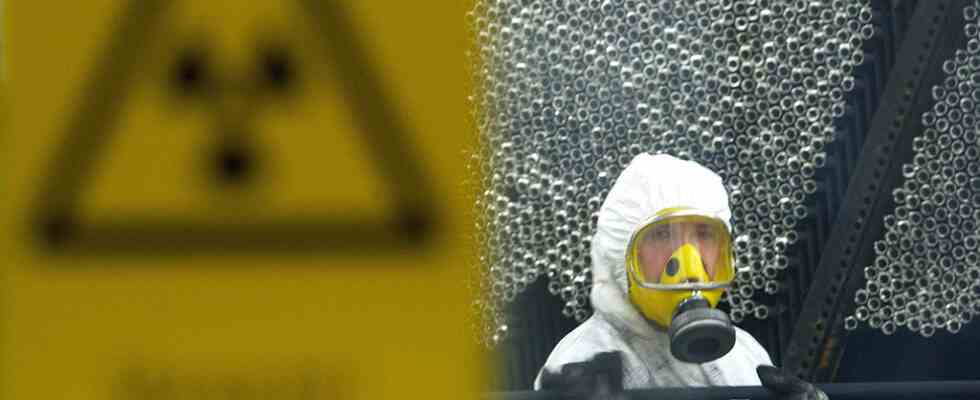Exclusive
Status: 05/05/2022 1:27 p.m
The nuclear industry bought its way out of the waste disposal costs with a fund worth billions. The money should be invested in a climate-friendly and responsible manner – which is not always the case.
Anja Mikus is an experienced investment banker. But the task she took on in the summer of 2017 was new territory even for her. As chairwoman of the board of the first German state fund, Mikus assumed responsibility for 24 billion euros – money that the energy giants e.on, RWE, EnBW and Vattenfall had paid into a “nuclear fund” in order to get rid of any risks from the future disposal of nuclear waste. Since then it has been borne by the state.
Commitment to sustainable investments
And so it is up to Mikus and her team of asset managers to earn so much money with clever investments that the radioactive waste from the German nuclear power plants can eventually be safely disposed of in interim and final storage facilities.
The fund is legally obliged to contribute to the achievement of climate goals and to invest its billions according to the criteria of the environment, social issues and responsible corporate governance. “In all investments that we make,” Mikus asserted in a newspaper interview, “sustainability is of central importance to us.”
Portfolio secret for a long time
But how sustainably does the German sovereign wealth fund really invest its money? Everyone who wanted to form their own picture was disappointed for a long time. The nuclear fund did not make public the companies or countries in which it specifically invested. In February, a user of the online portal “Ask the State” finally asked the sovereign wealth fund to make its investments public which shares and at what value the funds were invested.
Shortly after a Freedom of Information Act request, the Fund self-published its investments on its website. All the companies and countries in which the sovereign wealth fund invested as of December 31, 2020.
Fund defends gas investments
Of the WDR evaluated the data. According to the report, the fund, which aims to reduce carbon emissions, has nevertheless invested 757.9 million euros, 3.2 percent of the assets, in oil and gas companies.
A spokesman explained on request that the nuclear fund had ruled out the use of fracking in the production of oil and gas and the production of oil from tar sands. “However, the fund has not ruled out conventional gas production. From the Federal Government’s point of view, gas plays an important role as a transitional technology towards a CO2-free economy.”
Funds also invested in cum-ex banks
The evaluation also shows that the nuclear fund invested at least until the end of 2020 in several major banks that were involved in the cum-ex scandal and against whose leaders the public prosecutor’s offices in Cologne and Frankfurt are investigating in Germany’s largest tax scandal.
For example, the fund invested in Deutsche Bank (the sovereign wealth fund held shares worth EUR 2.7 million as of the reporting date), the Spanish Banco Santander (EUR 6.7 million), the French BNP Paribas (EUR 7.4 million) and the Australian Macquarie Bank (almost 3 million euros). At the Dutch ABN Amro (545,000 euros), the British Barclays Bank (3.5 million euros) and the US Morgan Stanley (22.4 million euros) there were recently even cum-ex raids in Frankfurt.
No decision on reallocation yet
However, it is unclear whether the cum-ex past will lead to the sovereign wealth fund taking banks out of the portfolio in the future. A spokesman for the fund said that governance criteria are an essential part of the nuclear fund. “The transparency of companies with regard to tax payments as well as controversial behavior such as tax evasion or avoidance are governance aspects that are considered when investing.”
Accordingly, he critically evaluates the cum-ex deals as “unacceptable.” Consequently, cum-ex transactions were qualified as tax evasion by the case law of the Federal Court of Justice in July 2021 and have been prevented by a change in the law since January 2012.
Waiting for rating agencies
However, whether individual stocks should be removed from the fund would only be checked if the relevant rating agencies rated the companies for sustainability and downgraded the banks. However, this would require reliable evidence of the misconduct. “That’s why there will ultimately always be individual decisions on this,” said the spokesman.
It is therefore quite possible that the German state fund will continue to invest in banks in the future, which are said to have deprived the state of billions with cum-ex transactions.
Also stake in Russian companies
The fund spokesman also responded evasively to the question of whether the German sovereign wealth fund still held shares in Russian companies in view of the Russian war of aggression in Ukraine. As of December 31, 2020, this was the case. The nuclear fund held shares worth 17 million euros in the Russian Sberbank and the oil company Lukoil worth 26 million euros.
The question of whether the sovereign wealth fund still holds the shares today remains unanswered. In the middle of the year, the fund will publish new data at the same time as the annual financial statements. Nor does he go into the question of whether he has also invested in the Russian companies Gazprom or Rosneft since the last publication.
The operators of the “Ask the State” platform are currently examining legal steps and are demanding that the fund must make further details of the investments public. One thing is certain: as of December 31, 2020, the fund held Russian government bonds worth 79.5 million euros and Belarusian government bonds worth 1.3 million euros. It says: The Belarusian government bonds have been completely disposed of, the Russian ones were largely sold off before the war of aggression against Ukraine – at the moment the fund still holds residual amounts of Russian government bonds worth 2.7 million euros.

